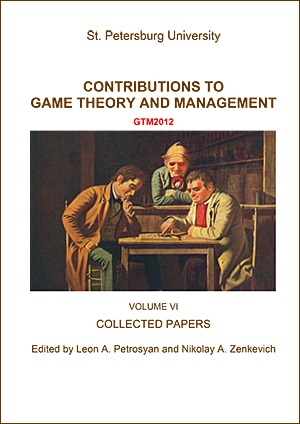Analysing the Folk Theorem for Linked Repeated Games
Abstract
We deal with the linkage of infinitely repeated games. Results are obtained by analysing the relations between the feasible individually rational payoff regions of the isolated games and the linked game. In fact we have to handle geometric problems related to Minkowski sums, intersections and Pareto boundaries of convex sets.
Keywords:
asymmetries, convex set, feasible individually rational payoff region, Folk theorem, full cooperation, linking, Minkowski sum, Pareto boundary, tensor game
Downloads
References
Benoît, J. and V. Krishna (1996). The Folk theorems for repeated games: A synthesis. Technical report, New York University, Penn State University.
Bernheim, B. and M. Whinston (1990). Multimarket contact and collusive behavior. Rand Journal of Economics, 21(1), 1–26.
Botteon, M. and C. Carraro (1998). Strategies for environmental negotiations: Issue linkage with heterogeneous countries. In: Game Theory and the Environment (Hanley, N. and H. Folmer, eds). Edward Elgar, Cheltenham.
Carraro, C. and D. Siniscalco (1999). International environmental agreements: Incentives and political economy. European Economic Review, 42(3–5), 561–572.
Finus, M. (2001). Game Theory and International Environmental Cooperation. Edward Elgar, Cheltenham (UK).
Folmer, H. and P. H. M. von Mouche (1994). Interconnected games and international environmental problems, II. Annals of Operations Research, 54, 97–117.
Folmer, H. and P. H. M. von Mouche (2000). Transboundary pollution and international cooperation. In: The International Yearbook of Environmental and Resource Economics 2000/2001 (Tietenberg, T. and H. Folmer, eds), pp. 231–266. Edward Elgar, Cheltenham.
Folmer, H. and P. H. M. von Mouche (2007). Linking of repeated games. When does it lead to more cooperation and pareto imporvements. Technical Report Nota Di Lavoro 60.2007, Fondazione Eni Enrico Mattei, Milano.
Folmer, H., P. H. M. von Mouche, and S. Ragland (1993). Interconnected games and international environmental problems. Environmental and Resource Economics, 3, 313–335.
Just, R. and S. Netanyahu (2000). The importance of structure in linking games. Agricultural Economics, 24, 87–100.
Ragland, S. (1995). International Environmental Externalities and Interconnected Games. PhD thesis, University of Colorado.
Spagnolo, G. (1999). On interdependent supergames: Multimarket contact, concavity and collusion. Journal of Economic Theory 89/1, 89(1), 127–139.
Downloads
Published
How to Cite
Issue
Section
License
Articles of "Contributions to Game Theory and Management" are open access distributed under the terms of the License Agreement with Saint Petersburg State University, which permits to the authors unrestricted distribution and self-archiving free of charge.




